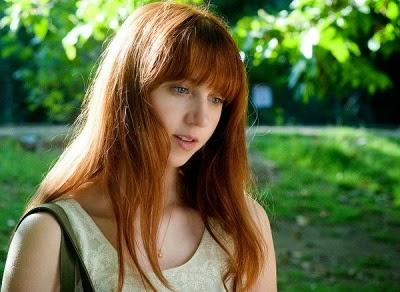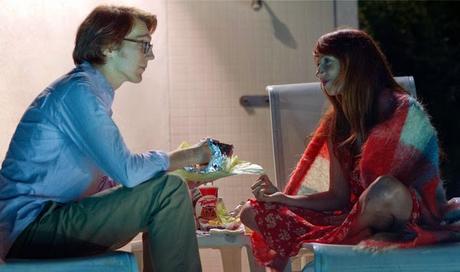 One knock against the "indie film" subgenre is the annoying female leads. Nathan Rabin dubbed these strange creatures "Manic Pixie Dream Girls"; I prefer twits. From Natalie Portman in Garden State to Zooey Deschanel in (500) Days of Summer, they're obnoxious male fantasies masquerading as quirk: twee, personality-free vessels for empty eccentricity, yet hot enough to slake Zack Braff's dork lust. Blech.
One knock against the "indie film" subgenre is the annoying female leads. Nathan Rabin dubbed these strange creatures "Manic Pixie Dream Girls"; I prefer twits. From Natalie Portman in Garden State to Zooey Deschanel in (500) Days of Summer, they're obnoxious male fantasies masquerading as quirk: twee, personality-free vessels for empty eccentricity, yet hot enough to slake Zack Braff's dork lust. Blech.That's doubtless why I enjoyed Ruby Sparks (2012) so much. Little Miss Sunshine directors Jonathan Dayton and Valerie Faris deconstruct this most irritating archetype, helped by scenarist-star Zoe Kazan. It's a clever, caustic comedy that's both insightful and disturbing.
Depressed author Calvin Weir-Fields (Paul Dano) has never matched his debut novel. Then he creates Ruby Sparks (Zoe Kazan), a character who embodies his ideal woman. Imagine his shock when Ruby becomes real! Initially Calvin's thrilled, until he discovers that Ruby's a woman with her own feelings and personality. So Calvin rewrites Ruby to suit his needs, with increasingly twisted results.
Ruby Sparks provides a disturbing exploration of an artist's mind. Like all entitled indie heroes, Calvin whines about his dissatisfaction with success and inability to meet the right woman while screwing groupies. Brother Harry (Chris Klein), happily married, tries puncturing his mania: "You haven't created a woman; you've created a girl." Then Calvin's ex-girlfriend Lila (Deborah Ann Woll) arrives. After a movie's build-up as a Queen Bitch, she excoriates Calvin for not supporting her career. How dare Calvin's friends and lovers have their own dreams!

Naturally, Calvin's selfishness manifests itself in Ruby. She starts as a list of personality traits (unable to drive, crushes on John Lennon and Humphrey Bogart) without depth, which suits Calvin well. Made flesh however, she shows disturbing signs of independence: she resents being Calvin's sole source of companionship, demanding space and finding work. Too bad Calvin can literally control her existence, rewriting her into a clingy train wreck. It culminates in a disturbing, darkly-funny scene where he forces Ruby to declare his genius and bark like a dog.
It's to the filmmaker's credit that Calvin retains some sympathy. Artists are innately selfish, and Calvin's character arc teaches him to appreciate human frailty. He's less Woody Allen than Marcello Mastroianni in 8 1/2, so obsessed with fantasy that the real world seems alien. Similarly, Ruby reveals depth in gradual shades. Even a stock figure like Ruby can't exist purely to please Calvin: she lashes out at the emptiness of her one-track existence, wondering why she can't pursue her own interests.
Paul Dano is compelling as a brilliant man-child who can't handle adult relationships. Zoe Kazan is alternately winsome, wounded and exasperating, admirably game for anything. (Perhaps it's notable than Dano and Kazan are a real-life couple.) Elliott Gould plays Calvin's psychiatrist; Steve Coogan (In the Loop), his lecherous agent. Chris Klein's excellent as Calvin's well-adjusted brother. Annette Benning and Antonio Banderas have extended cameos as Calvin's parents.
Ruby Sparks is a winning movie (and, rest assured, much funnier than this review lets on). Sure, there's irritating indie flourishes like Calvin's zany parents (more annoying than funny) and the soundtrack's inexplicable French pop song covers, but they're minor flaws. Sharp humor, probing insight and winning performances combine for the most thoughtful comedy in recent memory.

